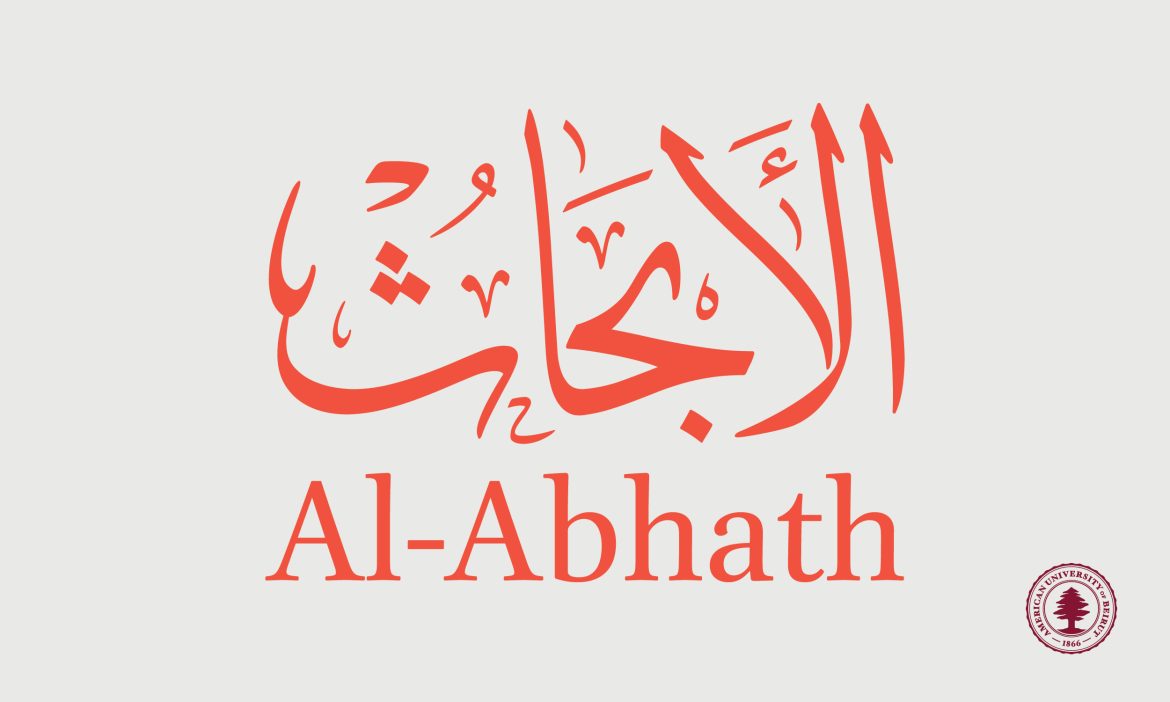The Faculty of Arts and Sciences at the American University of Beirut (AUB) proudly announces the publication of Al-Abhath Volume 73 (2025). As one of the Arab world’s oldest and most respected academic journals, Al-Abhath has long served as a platform for pioneering scholarship in Arabic and Islamic studies, language history, and literature, and the new issue continues this legacy.
The latest volume brings together an exciting constellation of contributions stretching across centuries and disciplines. Readers are first invited into the vibrant language of modern Arab street movements, where poetry becomes a rallying cry for sovereignty and change. In “The Return of the Street: The Iconic Language ‘Gain’ in Arab Grassroot Movements,” author Rim Chakraoui examines how contemporary protest poetry channels the voice of grassroots movements demanding change. The journey then moves to the enduring intellectual legacy of al-Ghazālī. In “Al-Ghazālī on Logic as a Means of Learning: Historical Evidence and Educational Implications,” Sebastian Günther highlights how the famed theologian harnessed Aristotelian logic as a tool for learning, drawing out educational insights that continue to resonate today. Further enriching the issue’s scope, Rachid Belahbib and Ramzi Baalbaki, in “The Genre Laḥn al-ʿĀmma (Solecism) in the Light of the Doha Historical Dictionary of the Arabic Language,” probe the delicate interplay between “correct” and “incorrect” Arabic in medieval lexicography.
Other studies delve into historical texts and linguistic debates with equal rigor. Wadad Kadi’s contribution, “An Umayyad Caliphal Letter from Iraq’s Archives?”, questions long-held assumptions about a mysterious Umayyad-era letter preserved in the Iraqi archives. Meanwhile, Rawane El Helou reexamines debates on colloquial Arabic in the medieval Mediterranean through the lens of newly compiled lexical sources. Her extensive comparative study, “The Most Linguistically Proficient One is He Who Never Accuses Others of Solecism: A Comparative Study of Select Responses by Ibn Hishām al-Lakhmī to the ‘Mistakes’ Made by Ibn Makkī al-Ṣiqillī Concerning Solecism in Light of the Doha Historical Dictionary of the Arabic Language,” revisits medieval arguments about language use and correctness. Together, these five articles highlight the vitality of both historical inquiry and contemporary analysis within the field of Arabic and Islamic studies.
In addition to original research articles, Al-Abhath 73 engages with new scholarship through a set of insightful book reviews. Professor Isabel Toral evaluates Reflecting Mirrors, East and West: Transcultural Comparisons of Advice Literature for Rulers (8th–13th Century) by Enrico Boccaccini, an exploration of transcultural political advice literature for medieval rulers. In another review, Amidu Olalekan Sanni examines Al-Sakhāwī: A Biographer of Mamlūk Cairo and His Dictionary of Women. Studies by Renate Jacobi, edited by Kirill Dmitriev, shedding light on the role of women in Mamlūk Cairo. Andrew Peacock offers insights into Baghdād: From Its Beginnings to the Fourteenth Century, edited by Jens Scheiner and Isabel Toral, while Ken Seigneurie assesses Islam and New Directions in World Literature, edited by Sarah R. Bin Tyeer and Claire Gallien, situating Islam’s place in global literary studies. Through these engagements, Al-Abhath continues to speak to the evolving concerns of regional and global scholarship.
Reflecting on the new issue, Professor Ramzi Baalbaki, co-editor of Al-Abhath, remarked, “This volume exemplifies our commitment to deepening philological and linguistic research. By reexamining language history in light of new sources and methods, we shed fresh light on how Arabic has developed across eras and contexts.”
Professor Bilal Orfali, co-editor of the journal, emphasized the diversity of the contributions: “What makes this issue remarkable is its range—from medieval archives to modern grassroots movements. The articles and reviews reflect the breadth of Arabic and Islamic studies today and the journal’s mission to foster dialogue across time and disciplines.”
Now in its seventy-third volume, Al-Abhath reaffirms its role as a cornerstone of academic inquiry in the region and beyond, continuing a legacy of excellence that bridges the historical and the contemporary.
About AUB
Founded in 1866, the American University of Beirut bases its educational philosophy, standards, and practices on the American liberal arts model of higher education. A teaching-centered research university, AUB has more than 790 full-time faculty members and a student body of over 9000 students. AUB currently offers more than 140 programs leading to bachelor’s, master’s, MD, and PhD degrees. It provides medical education and training to students from throughout the region at its Medical Center that includes a full-service 365-bed hospital.
Stay up to date on AUB news and events.
aub.edu.lb |Facebook |X

